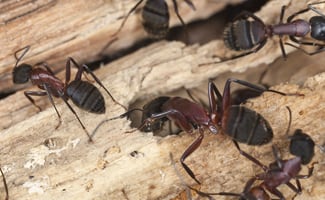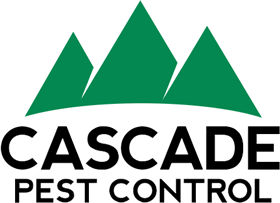Author: Kurt Treftz, Cascade Pest Control
The Pacific Northwest (PNW) is known for its beautiful vistas, stunning seascape, and temperate climate. All of this also makes it attractive to pests, including the exceedingly common ant.
There are a number of species of ants that call Washington home, and they thrive in its inviting climate and habitat.

PNW Beneficial Climate Characteristics and Their Impact on Ants
Temperature & Humidity
The Pacific Northwest is known for its mild temperatures and high humidity, which create an ideal environment for many pests. As ectothermic creatures, ants thrive in warm, but not extremely hot, temperatures. Most ant species are optimally active in temperatures between 77-95 degrees F. This is when they will most likely engage in foraging and reproductive behavior.
Rainfall & Moisture
Abundant rainfall in the area means high moisture levels, which are perfect for ants who prefer damp conditions like the Carpenter, Argentine, Pharaoh, and Moisture ants, as well as the invasive European Fire Ant. Most ant species in the PNW thrive in the damp, humid conditions to build their nests, find food, and maintain a healthy body temperature.
Seasonal Variations:
The temperate climate of the Pacific Northwest also lends itself to prime ant habitat. Ants activity peaks in the warmer months (late spring to early fall), but because of the mild winters, they can be active all year long. This means that any diapause (a deep sleep similar to hibernation) is usually shorter and not as deep, which allows ants to stay active through much of the winter. Staying active helps ants continue foraging and increases their chance of winter survival.
PNW Climate Effects on Ant Behavior & Ecology
Nesting & Foraging
The abundance of moist wood and vegetation in the Pacific Northwest is a boon to the nesting habits of ants. In addition to nesting sites, damp wood provides Carpenter ants what they need to create galleries essential to their survival. The rain also provides vast forests and foliage for foraging. Ants in the area are well-fed on all the organic matter in suburban lawns, farm fields, and even urban areas. The temperature also allows ants more optimal hours of foraging temperatures. Since the PNW rarely sees life-threatening heat or freezing temperatures, it is an excellent place for an ant to prosper.
Colony Distribution
The climate of the Pacific Northwest is highly conducive to growing ant colonies. The European Fire Ant has gained a foothold in the region as it thrives in the moderate climate. This invasive species has been known to displace native ant species as it flourishes in these conditions. With urban, suburban, and agricultural areas, there are plenty of prime opportunities for ants to set down their nests and grow their colonies.
Climate Change
As the threat of climate change looms, there can be impacts on ant species as well. Warmer conditions could lead to increased ant activity in some areas that could cause exponential ant growth, while extreme fluctuations could negatively impact other ant species.
Ant Adaptation & Management
Adaptation Strategies
Ants are well adapted to live in a variety of climates and conditions. They are found worldwide, in every continent and ecosystem (except Antarctica). So, they have had no problem making the PNW their home. They can nest under debris and wood structures, along pavement, and in homes. They are clever architects with the ability to create nests that maintain stable microclimates.
Management Practices
Learning to manage ant infestations is key to surviving in the Pacific Northwest. As a home or business owner, you can take steps to reduce moisture around your home, remove decaying organic matter, and seal all entry points to your structure. In addition, you can hire a pest management team, like Cascade Pest Control, to help inspect and deter pests using IPM (integrated pest management).
Understanding the effect of the climate on ants in the Pacific Northwest can make us better able to respond and repel them from our homes and businesses. You can count on Cascade to help you along the way. Give them a call at 888-989-8979.
